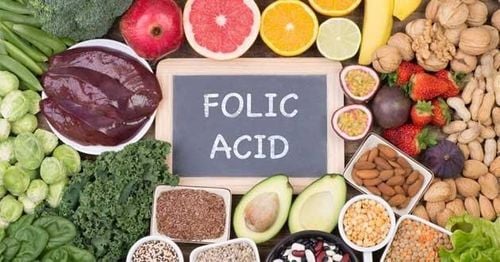Vitamins and minerals are one of the five main nutrient groups that the body needs. Understanding the properties of essential vitamins will help people balance their diet for better health.
1 The concept of essential vitamins for the body.
Vitamins are a group of nutrients essential for the body in very small amounts, yet they play a crucial role. Most foods we consume contain one or more types of vitamins, but the body often struggles to absorb them. As a result, deficiencies in this nutrient group can easily occur and significantly impact an individual’s immune system.
The absorption of vitamins in the body does not follow a fixed rule due to the different properties of each vitamin. Some vitamins are water-soluble, while others are fat-soluble, making it easy to experience difficulties in absorption and vitamin deficiencies even after consuming foods that contain those vitamins. Understanding the properties of each type will help us balance our diet for better health.

2 Common Vitamins and Their Food Sources
Here are 13 common vitamins and the foods that provide these essential nutrients for the body:
- Vitamin A: Dark-colored fruits, dark green vegetables, egg yolks, milk and dairy products, liver, etc.
- Vitamin C: Cabbage, broccoli, cauliflower, citrus fruits, potatoes, spinach, strawberries, tomatoes, etc.
- Vitamin D: Fatty fish (salmon, mackerel, herring), fish liver oil, milk, cheese, yogurt, butter, cream, etc.
- Vitamin E: Avocado, dark green foods (spinach, broccoli, asparagus, turnip greens), vegetable oils (canola, corn, sunflower), papaya, mango, nuts, seeds, wheat, etc.
- Vitamin K: Cabbage, cauliflower, cereals, dark leafy vegetables (spinach, kale, bok choy, turnip greens, broccoli, asparagus), liver, meat, fish, eggs, etc.
- Vitamin B1 (Thiamine): Milk, eggs, wheat flour, lean meat, bread, legumes, cereals, etc.
- Vitamin B2 (Riboflavin): Yogurt, meat, eggs, cheese, dark leafy vegetables, whole grains, etc.
- Vitamin B3 (Niacin): Avocado, eggs, wheat, cereals, tuna, poultry, legumes, nuts, potatoes, etc.
- Vitamin B5 (Pantothenic Acid): Avocado, some cruciferous vegetables, eggs, legumes, milk, mushrooms, organ meats, poultry, white sweet potatoes, whole grains, etc.
- Vitamin B6 (Pyridoxine): Bananas, beans, poultry, nuts, whole grains, etc.
- Vitamin B7 (Biotin): Chocolate, cereals, egg yolks, legumes, milk, nuts, organ meats, pork, etc.
- Vitamin B12 (Cyanocobalamin): Meat, eggs, milk, soy milk, organ meats, poultry, shellfish, etc.
- Vitamin B9 (Folic Acid): Asparagus, broccoli, turnips, brewer’s yeast, legumes, cereals, dark green vegetables, orange juice, peanut butter, wheat, etc.

3 Effects of Vitamins on the Body and Daily Recommended Intake
- Each type of vitamin plays a different role when absorbed by the body. Therefore, it is important to pay attention to the recommended intake to ensure proper supplementation without causing nutritional imbalances. The effects of each vitamin include:
- Vitamin A: Composed of retinoids and beta-carotene. The daily intake should be between 2,300 and 3,000 IU, depending on gender. This vitamin is crucial for bone development, helps reduce the risk of cancer, and boosts cellular immunity.
- Vitamin B1: Recommended daily intake is 1.1 to 1.2 mg. Vitamin B1 helps convert food into energy for the body and is beneficial for skin, hair, and brain health.
- Vitamin B2: Important for skin, hair, blood, and energy metabolism. The body needs 1.1 to 1.3 mg of vitamin B2 daily.
- Vitamin B5: In addition to converting food into energy, it helps produce fats and neurotransmitters. Daily intake should be 5 mg.
- Vitamin B6: The required amount varies by age. Adequate intake of vitamin B6 reduces the risk of heart disease, improves sleep quality, and enhances appetite. It also positively affects red blood cells, boosting cognitive function and immune system health.
- Vitamin B12: A daily intake of about 2.4 mg is recommended to lower the risk of cardiovascular diseases. This vitamin helps break down certain fats and amino acids, aiding in cell formation and regeneration.
- Vitamin B7: Requires 30 micrograms to ensure the ability to break down certain fatty acids and improve bone quality. It also helps synthesize glucose, converting it into energy for better productivity in work and studies.
- Vitamin C: Women should consume 70 mg and men 90 mg daily. A deficiency in vitamin C increases the risk of cancer and cataracts. Additionally, it helps produce collagen and boosts the immune system.

- Vitamin D is essential for bone development and the body’s immunity. Therefore, it is important to supplement vitamin D to reduce calcium loss, which can lead to osteoporosis or bone pain in older age.Vitamin E acts as an antioxidant, preventing free radicals from harming the body. The presence of vitamin E enhances the effectiveness of vitamin A. Moreover, vitamin E may reduce the risk of memory loss and Alzheimer’s disease.
Vitamin B9 should be provided at around 1,000 micrograms. For fetuses, this nutrient is crucial for the formation of the neural tube and brain. Additionally, adequate folate intake reduces the risk of heart disease and certain cancers, especially in women.
Vitamin K helps the body synthesize proteins and calcium, which are important for blood clotting and bone health in the hip region.
Vitamin B3 is beneficial for the skin and nervous system. When taken in higher amounts, vitamin B3 can significantly lower bad cholesterol levels.
4 Some Important Points to Know About Vitamin Supplementation
Vitamins and minerals are nutrients that do not need to be consumed in large quantities. Therefore, you should avoid exceeding the recommended dosage to prevent unwanted side effects.
Vitamins can be supplemented through food or extracted supplements. However, nutritionists always advise that providing vitamins naturally through food is the best option for the body. Only in cases of significant deficiency should you consider using supplements.
For fat-soluble vitamins A, D, E, and K, you should be cautious with their intake. Excessive consumption can lead to these vitamins being stored in excess fat, potentially harming your health.
All questions related to “what are the effects of vitamins?” and “which vitamins does the body need?” require careful research to ensure safe usage. If you want to learn more, consulting nutrition experts can help clarify any doubts.
Children need an adequate daily intake of zinc to ensure proper appetite, height, and weight. Zinc plays a crucial role in almost all biological processes in the body, especially in the synthesis and breakdown of nucleic acids and proteins. A deficiency in zinc can lead to various health issues, such as neurological disorders and irritability. Therefore, parents should learn about the role of zinc and how to supplement it appropriately for their children.
In addition to zinc, parents should also provide other important vitamins and minerals for their children, such as lysine, chromium, and B vitamins, to help them eat well, maintain a good immune system, and enhance resistance to minor illnesses.





